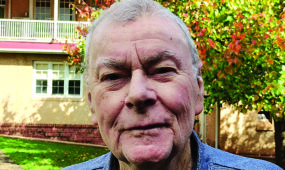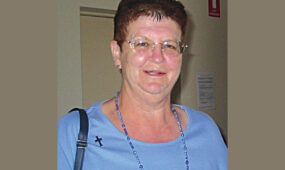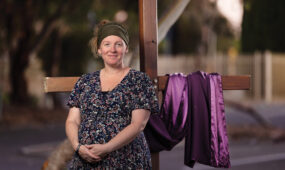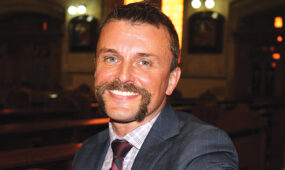Letter from Odesa
People
Emmaus parishioner Maurice O'Connell has spent much of the past 14 months volunteering for an aid organisation in Ukraine. In a letter to the Catholic Women’s League Next Gen group, which has been raising funds for the charity, he writes about the continuing impact of war on the country and its people.
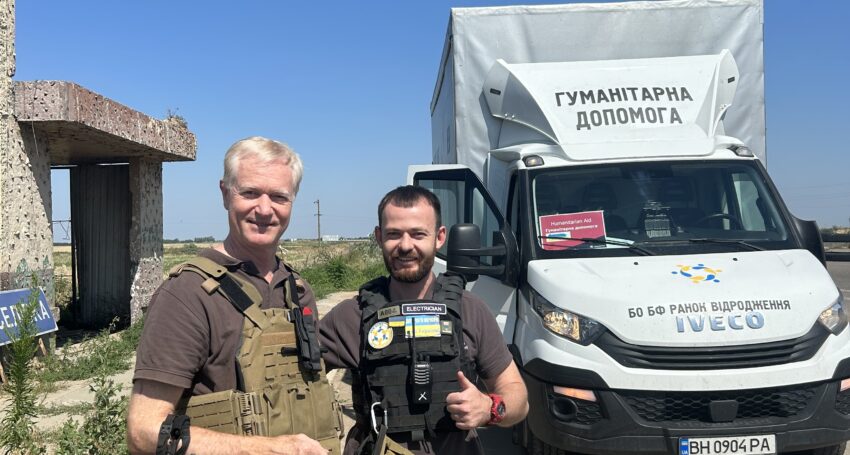
Like in many Eastern European countries, late spring and early summer in southern Ukraine is traditionally a time of lengthening days, but more than a year into Putin’s invasion, the landscape has become blighted by the signs of war – destroyed buildings, warnings of mined roads and farmland, fresh soldiers’ graves marked by Ukrainian flags in village cemeteries, rusting military equipment, villagers queuing for aid and hungry dogs eager for companionship and food.
Advertisement
I have been back with New Dawn for four months and it is hard to fathom how quickly that time has passed. On the other hand, it seems a lifetime since I departed Adelaide. When I arrived in Odesa in early March, there were days when it was still bitterly cold but clearly the worst of winter was behind and everyone was deeply thankful to have come through a terrible winter when people were regularly deprived of light, heat and subject to the uncertainty of almost daily rocket attacks on the national electricity infrastructure.
Almost all my old New Dawn team were still here doing much the same as they had when I left. The main difference was that people were tired and the hard winter had taken its toll, especially among the women. For days even the luxury of running water was absent. This was worst for people who live in high rise apartments. No electricity meant no light, no lifts, no running water for showers, washing or toilets and maybe worst of all, no heating.
Now we have days when it feels like summer has truly arrived. Life in Odesa is almost normal. This is maybe best illustrated by the beaches. A year ago they were mined and grasses and bushes were reclaiming the public beaches. Now they are populated with sunbathers and children. The reminder of war though is never far away. Two weeks ago a Russian missile slammed into a building only 400m away from our hub. Fortunately, it hit a business centre in the middle of the night when it was unoccupied but the damage to the tower block and surrounding buildings was significant. Had it hit the adjacent residential tower there would have been a lot more than just three fatalities. We lost 17 windows at the back of the hub. Air raid alerts are common, especially between 1am and 3am.
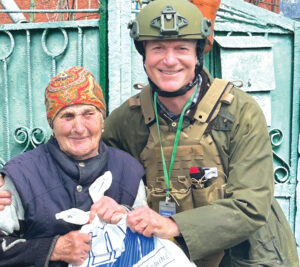
Maurice O’Connell delivers an aid package to an elderly woman in one of the ‘forgotten villages’ in Ukraine.
Our work remains much the same as when I was here last year. We still provide 100 food packs daily to Internally Displaced Persons (IDPs) who gather outside the hub as early as 7am waiting for the doors to open at 10am. What has changed is the number of aid runs that we do to our ‘forgotten villages’.
Before, the front line was about 25km south of Mykolaiv, halfway between Mykolaiv and Kherson. Most of the villages on the Ukrainian side had been deserted. Now, following the liberation of Kherson, the front line is on the Dnieper River. There is a large swathe of formerly occupied territories where many people have returned to villages that were heavily fought over. The destruction is extensive and there are many who are struggling to rebuild their homes and their lives.
Advertisement
We are fortunate to have significant backing from two German NGOs, Johanniter and the Boeselager Foundation. Caritas has also partnered with us. They provide the funding and direct aid while New Dawn provides the people and logistic capacity to deliver the aid that these organisations provide.
We have a fleet of vans as well as two trucks and can travel as far as 400km to deliver our aid. We also provide roofing materials, sufficient to provide roofing to nearly 2000 homes. It is an incredible feat for a group of Ukrainian volunteers who assembled on or soon after February 24 2022 to do what they could for their fellow Ukrainians. The only other foreigner here is Philipp, representing the German organisations.
Although New Dawn is now well funded, the money can only be applied to specific purposes and there are some major gaps where there is no funding. This is where I can step in with the money raised in Adelaide before I left to return to Odesa. The largest amount is the $8000 or so raised by the local parish-sponsored garage sale.
About half has now been spent and much of that has been to support the volunteers under my ‘Help the Helpers’ initiative. A number of former volunteers now have salaries but there are many who do not and who come in daily or very regularly to volunteer their services packing food hampers, running the registration desk or unloading trucks. Many are themselves displaced persons.
With the money raised I am able to fund medical bills up to the value of A$100 upon receipt of a doctor’s certificate. In the case of an emergency or truly special need I can offer more. I have also given modest cash grants to the two families of volunteers who have had direct soldier relatives killed in the war. I dreaded this news but it was inevitable given the number of volunteers with fathers or husbands in the army.
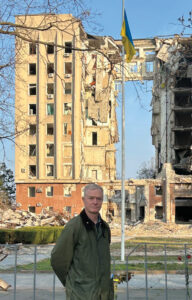
Maurice in the badly damaged city of Mykolaiv.
I have also helped Misha, the man from Mariupol whose wife and daughter were killed in their apartment by a Russian shell and who had to bury their bodies in the communal garden. Last week I gave $1000 to a small local Ukrainian group which is setting up a ‘Dignity Centre’ for IDPs. The concept is to have a number of small businesses operating from their premises. These will be run by the IDPs and their customers will be other IDPs who will pay a token amount and also to the general public at a higher price. This will give the IDPs operating the businesses a small income. Our money will help establish a small café. It is an important step providing both dignity and a level of financial stability to people who are now refugees in their own country and who in many instances have lost everything.
One of the enduring memories will be the stories that I hear in every village that was occupied by the Russians. There is a common theme of theft, intimidation and even torture – the man who was told to hand over the keys to his new tractor or be shot, another who was missing almost all his teeth as a result of brutal interrogation by Russian soldiers.
We at New Dawn are drawn to where the needs are the greatest and now are venturing into Kherson City. We were there during the flooding and have returned to see what we can do now. (The Kakhovka Dam was destroyed on June 6.) The amount of destruction caused by water levels that rose 6.4m is difficult to comprehend. Entire blocks of houses were totally submerged and the force of the water has washed away walls, mortar and collapsed ceilings and walls into piles of mud and debris. Above all there is the smell of rotting fabric, decay and mould. Yet people still live there. Just.
There are no major NGOs there as the shelling from the Russian side of the river is constant. We are now working with a small team of around 25 locally-based volunteers operating out of a small compound in Kherson about 300m from the river. They send out teams to help clear debris, operate water pumps and deliver aid in the form of food, hygiene, bedding and other essentials. There is no government assistance to speak of. Once again, it is the sight of Ukrainians helping Ukrainians that inspires me every day and shows me that I am in the right place and could not be anywhere else at this time.
Related Story
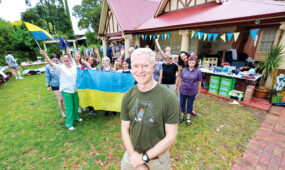 People
People
Finding light in darkness of war
As I write this we are preparing for tomorrow’s journey to Kherson. Helmets and body armour have been loaded into the two vans along with 500 food packs. It is seen as an ordinary day in the office. It is everything but that.
Postscript: The delivery of aid close to the river’s edge was curtailed when a Russian shell landed first to the left and then another landed to the right of us about 200-250m away. It was evident we had been spotted by a drone and our humanitarian truck and vans were targeted. Having been bracketed by artillery, we departed immediately. We returned an hour later and completed our distribution uneventfully.


